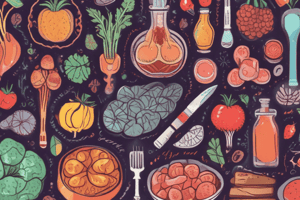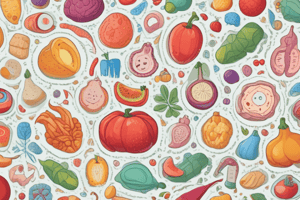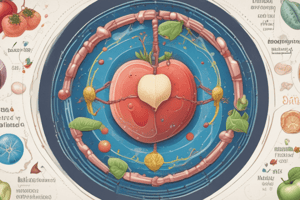Podcast
Questions and Answers
What is the primary function of enzymes in food processing?
What is the primary function of enzymes in food processing?
- To enhance the flavor of food
- To aid in the digestion of nutrients
- To preserve food for longer periods
- To accelerate chemical reactions (correct)
Which process directly involves the breakdown of glucose during glycolysis?
Which process directly involves the breakdown of glucose during glycolysis?
- Anaerobic respiration
- Hydrolysis
- Fermentation
- Catabolism (correct)
Which statement best describes the TCA cycle?
Which statement best describes the TCA cycle?
- It is a part of aerobic respiration. (correct)
- It occurs in the cytoplasm of cells.
- It converts glucose into lactic acid.
- It occurs only in plant cells.
What characteristic distinguishes genetically modified food?
What characteristic distinguishes genetically modified food?
What role does the pyruvate dehydrogenase complex play in metabolism?
What role does the pyruvate dehydrogenase complex play in metabolism?
What is a key feature that distinguishes prokaryotic cells from eukaryotic cells?
What is a key feature that distinguishes prokaryotic cells from eukaryotic cells?
In biochemical reactions, what is the significance of free energy?
In biochemical reactions, what is the significance of free energy?
Which statement correctly describes tertiary structure in proteins?
Which statement correctly describes tertiary structure in proteins?
Which of the following best describes enzymes?
Which of the following best describes enzymes?
What role do functional groups play in biomolecules?
What role do functional groups play in biomolecules?
What is the primary focus of the course TPN 1241 Biokimia Pangan Dasar?
What is the primary focus of the course TPN 1241 Biokimia Pangan Dasar?
Which of the following is NOT a expected learning outcome of the course?
Which of the following is NOT a expected learning outcome of the course?
Who is the coordinator of the course TPN 1241 Biokimia Pangan Dasar?
Who is the coordinator of the course TPN 1241 Biokimia Pangan Dasar?
How many credits is the course TPN 1241 Biokimia Pangan Dasar worth?
How many credits is the course TPN 1241 Biokimia Pangan Dasar worth?
In relation to food biotechnology, which topic is covered in the course?
In relation to food biotechnology, which topic is covered in the course?
What role do food macromolecules play according to the course outline?
What role do food macromolecules play according to the course outline?
What is emphasized in the cognitive level for each topic in the course outline?
What is emphasized in the cognitive level for each topic in the course outline?
What is the primary focus of the electron transport chain in oxidative phosphorylation?
What is the primary focus of the electron transport chain in oxidative phosphorylation?
Which term refers to the theory explaining how a proton gradient leads to ATP production?
Which term refers to the theory explaining how a proton gradient leads to ATP production?
In the context of food biochemistry, which aspect is particularly important for post-harvest physiology?
In the context of food biochemistry, which aspect is particularly important for post-harvest physiology?
What will students focus on in the PBL case study breakout rooms?
What will students focus on in the PBL case study breakout rooms?
What is covered in week 12 of the course outline?
What is covered in week 12 of the course outline?
Which grading scale corresponds to a grade of B?
Which grading scale corresponds to a grade of B?
Flashcards are hidden until you start studying
Study Notes
Course Introduction
- The course is titled "TPN 1241 Biokimia Pangan Dasar"
- The course is offered by the Department of Food Science and Technology, Faculty of Agricultural Technology, IPB University
- The course is accredited by ASIIN, IFT, and IUFoST
Course Description
- The course is worth 3 credits
- Instructors: Dr.Puspo Edi Giriwono (PEG), Prof.Dr.Sedarnawati Yasni (SYA), Ir.Sutrisno Koswara, M.Si (SKO), Dr.Saraswati (SAR)
- The course covers basic biochemistry and molecular biology principles, post harvest physiology and food biotechnology
Course Objectives
- Students will learn fundamental biochemistry and molecular biology
- Students will learn characteristics of food, food enzymology, food bioenergetics, food biotechnology
- Students will learn about cell compartments and macromolecules in food
- Students will learn about biochemical processes, ATP generation, role of foods, and basic genetics in relation to food biotechnology
Course Outline
- Week 1
- Course Introduction
- Rules
- Specific learning outcomes
- Cognitive levels by topic
- Cell: Prokaryotic cells, Eukaryotic cells, Cell compartment and their characteristics
- Week 2
- Water and Biomolecules: Polarity and hydrogen bond, Non covalent interactions in biomolecule, Functional groups in biomolecule, Building blocks of biomolecule
- Week 3
- Energetics in Biochemical Reactions: Basic terminologies, Redox, free energy, thermodynamic laws, Case study and example
- Week 4
- Amino Acid and Proteins: Structure and classification of amino acid, Primary, Secondary, Tertiary, and Quaternary structure, Protein in Action; Meat Protein and Hemoglobin
- Week 5
- Enzymology: Definition and classification of enzyme, Catalytic mechanism; Chymotrypsin, Enzyme activity and kinetics, Enzymes in Food, Enzymes in Food Processing
- Week 6
- DNA, Protein Synthesis: Nucleic acid and its building block, Replication, transcription, and translation
- Week 7
- Food Biotechnology: Gene technology, Genetically modified food, Applications
- Week 8
- Metabolism of Macromolecules: Digestion of macromolecules, Catabolism and anabolism, Glycolysis: Steps and pathways of glycolysis, Energy balance, Downstream process, Pyruvate dehydrogenase complex
- Week 9
- TCA Cycle: Precursor of TCA cycle, Fatty acid and AA deamination, Step and pathway, Energy Balance, Electron Transport Chain: Compounds in oxidative phosphorylation, Electron transport chain complex, Proton gradient and chemical osmotic theory, ATP generating system
- Week 10
- Food Biochemistry in Plants: Important reactions in post harvest physiology, Biochemical changes during post harvest, Biochemical changes during post mortem, Implication on quality of food
- Week 11
- Food Biochemistry in Animals: Important reactions in post harvest physiology, Biochemical changes during post harvest, Biochemical changes during post mortem, Implication on quality of food
- Week 12
- Studium Generale: Insights on application of food biochemistry in the food industry
- Week 13
- Project Based Learning: Case Study - Solving food issues/problems from biochemistry aspect.
- Week 14
- Project Based Learning: Group Presentations of group papers based on case study
Grading
- Grading Criteria
- Midterm Exam
- Final Exam
- Other assessments (details not provided)
- Weighting
- Midterm Exam (25%)
- Final Exam (25%)
- Other assessments (50%)
- Grading Scale (based on score and letter grade)
- A (4.0): 80-100
- AB (3.5): 75-79
- B (3.0): 70-74
Studying That Suits You
Use AI to generate personalized quizzes and flashcards to suit your learning preferences.




